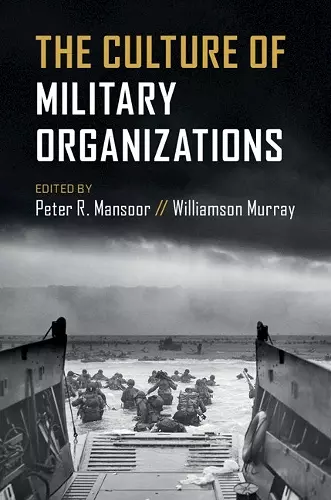The Culture of Military Organizations
Williamson Murray editor Peter R Mansoor editor
Format:Paperback
Publisher:Cambridge University Press
Published:17th Oct '19
Should be back in stock very soon
This paperback is available in another edition too:
- Hardback£95.00(9781108485739)

Examines how military culture forms and changes, as well as its impact on the effectiveness of military organizations.
This examination of military culture shows how it underpins the effectiveness of military organizations. Sixteen case studies focusing on armies, navies, and air forces from the Civil War to the Iraq War help to explain why some organizations succeed while others fail in the ultimate arbitration of war.Culture has an enormous influence on military organizations and their success or failure in war. Cultural biases often result in unstated assumptions that have a deep impact on the making of strategy, operational planning, doctrinal creation, and the organization and training of armed forces. Except in unique circumstances culture grows slowly, embedding so deeply that members often act unconsciously according to its dictates. Of all the factors that are involved in military effectiveness, culture is perhaps the most important. Yet, it also remains the most difficult to describe and understand, because it entails so many external factors that impinge, warp, and distort its formation and continuities. The sixteen case studies in this volume examine the culture of armies, navies, and air forces from the Civil War to the Iraq War and how and why culture affected their performance in the ultimate arbitration of war.
'The Culture of Military Organizations explains superbly the importance of military culture and clearly demonstrates how culture underpins the effectiveness of armed force. Culture, once formed, is difficult to change; it cannot always be 'tamed,' but it can and should be understood. This book makes an enormous contribution in helping to foster that understanding. The history is first-rate, the analysis incisive, and the conclusions of enormous value to military leaders and policy makers today.' General David Petraeus, US Army (Ret.), former commander of the surge in Iraq, US Central Command, and Coalition Forces in Afghanistan
'A brilliant set of analyses of military cultures that captures the nature of military culture and an understanding of its importance. This is an important work written at a time when military innovation and transformation are being hotly discussed and debated. This is a must read for all those military leaders attempting to develop organizations that can meet the challenges posed by a new and different security environment.' General Anthony C. Zinni, United States Marine Corps (Ret.)
'The old Druckerism that 'culture eats strategy for breakfast' is aptly demonstrated in this erudite yet accessible book. Murray and Mansoor reveal how military culture eats strategy, operational logic and sound tactics in every war. Students of military history will revel in its insights and professors will find it chocked with invaluable lessons for the classroom.' Colonel Frank Hoffman, United States Marine Corps (Ret.)
'Invaluable perspectives on what may be the most important determinant of victory or defeat in war. Students of warfare and those responsible for military effectiveness will find important insights that not only impart understanding, but also illuminate ways to accentuate positive elements of military culture or compensate for deficiencies.' H.R. McMaster, Stanford University
'The editors assembled a strong roster of contributors; there are no weak chapters as sometimes occurs in such works. Though the quality is uniformly good, the great strength of the cases is their diversity. There is a temporal balance with the late 19th, early and late 20th centuries represented in roughly equivalent parts.' Col. J.P. Clark, ARMY Magazine
'This volume makes a useful contribution to begin global historical explorations of military culture.' Thomas Furse, Journal of Contemporary History
ISBN: 9781108724487
Dimensions: 227mm x 152mm x 26mm
Weight: 680g
482 pages